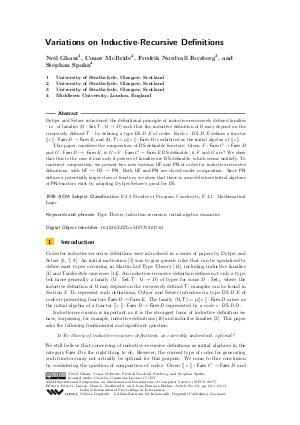Variations on Inductive-Recursive Definitions
Authors Neil Ghani, Conor McBride, Fredrik Nordvall Forsberg, Stephan Spahn
-
Part of:
Volume:
42nd International Symposium on Mathematical Foundations of Computer Science (MFCS 2017)
Part of: Series: Leibniz International Proceedings in Informatics (LIPIcs)
Part of: Conference: Mathematical Foundations of Computer Science (MFCS) - License:
 Creative Commons Attribution 3.0 Unported license
Creative Commons Attribution 3.0 Unported license
- Publication Date: 2017-12-01
File

PDF
LIPIcs.MFCS.2017.63.pdf
- Filesize: 468 kB
- 13 pages
Document Identifiers
Subject Classification
Keywords
- Type Theory
- induction-recursion
- initial-algebra semantics
Metrics
- Access Statistics
-
Total Accesses (updated on a weekly basis)
0PDF Downloads0Metadata Views
Abstract
Dybjer and Setzer introduced the definitional principle of inductive-recursively defined families - i.e. of families (U : Set, T : U -> D) such that the inductive definition of U may depend on the recursively defined T --- by defining a type DS D E of codes. Each c : DS D E defines a functor [c] : Fam D -> Fam E, and (U, T) = \mu [c] : Fam D is exhibited as the initial algebra of [c]. This paper considers the composition of DS-definable functors: Given F : Fam C -> Fam D and G : Fam D -> Fam E, is G \circ F : Fam C -> Fam E DS-definable, if F and G are? We show that this is the case if and only if powers of families are DS-definable, which seems unlikely. To construct composition, we present two new systems UF and PN of codes for inductive-recursive definitions, with UF a subsytem of DS a subsystem of PN. Both UF and PN are closed under composition. Since PN defines a potentially larger class of functors, we show that there is a model where initial algebras of PN-functors exist by adapting Dybjer-Setzer's proof for DS.
Cite As Get BibTex
Neil Ghani, Conor McBride, Fredrik Nordvall Forsberg, and Stephan Spahn. Variations on Inductive-Recursive Definitions. In 42nd International Symposium on Mathematical Foundations of Computer Science (MFCS 2017). Leibniz International Proceedings in Informatics (LIPIcs), Volume 83, pp. 63:1-63:13, Schloss Dagstuhl – Leibniz-Zentrum für Informatik (2017)
https://doi.org/10.4230/LIPIcs.MFCS.2017.63
BibTex
@InProceedings{ghani_et_al:LIPIcs.MFCS.2017.63,
author = {Ghani, Neil and McBride, Conor and Nordvall Forsberg, Fredrik and Spahn, Stephan},
title = {{Variations on Inductive-Recursive Definitions}},
booktitle = {42nd International Symposium on Mathematical Foundations of Computer Science (MFCS 2017)},
pages = {63:1--63:13},
series = {Leibniz International Proceedings in Informatics (LIPIcs)},
ISBN = {978-3-95977-046-0},
ISSN = {1868-8969},
year = {2017},
volume = {83},
editor = {Larsen, Kim G. and Bodlaender, Hans L. and Raskin, Jean-Francois},
publisher = {Schloss Dagstuhl -- Leibniz-Zentrum f{\"u}r Informatik},
address = {Dagstuhl, Germany},
URL = {https://drops.dagstuhl.de/entities/document/10.4230/LIPIcs.MFCS.2017.63},
URN = {urn:nbn:de:0030-drops-81184},
doi = {10.4230/LIPIcs.MFCS.2017.63},
annote = {Keywords: Type Theory, induction-recursion, initial-algebra semantics}
}
Author Details
References
-
Michael Abbott, Thorsten Altenkirch, and Neil Ghani. Containers: Constructing strictly positive types. TCS, 342(1):3 - 27, 2005.

-
Thorsten Altenkirch, Neil Ghani, Peter Hancock, Conor McBride, and Peter Morris. Indexed containers. Journal Functional Programming, 25, 2015.

-
James Chapman, Pierre-Évariste Dagand, Conor McBride, and Peter Morris. The gentle art of levitation. In ICFP 2010, pages 3-14, 2010.

-
Peter Dybjer. Inductive families. Formal aspects of computing, 6(4):440-465, 1994.

-
Peter Dybjer. A general formulation of simultaneous inductive-recursive definitions in type theory. Journal of Symbolic Logic, 65(2), 2000.

-
Peter Dybjer and Anton Setzer. A finite axiomatization of inductive-recursive definitions. In TLCA, pages 129-146. Springer Verlag, 1999.

-
Peter Dybjer and Anton Setzer. Induction-recursion and initial algebras. Annals of Pure and Applied Logic, 124(1-3):1-47, 2003.

-
Peter Dybjer and Anton Setzer. Indexed induction-recursion. Journal of logic and algebraic programming, 66(1):1-49, 2006.

-
Nicola Gambino and Martin Hyland. Wellfounded trees and dependent polynomial functors. In Types for Proofs and Programs, pages 210-225, 2004.

-
Nicola Gambino and Joachim Kock. Polynomial functors and polynomial monads. Mathematical Proceedings of the Cambridge Philosophical Society, 154:153-192, 2013.

-
Neil Ghani and Peter Hancock. Containers, monads and induction recursion. Mathematical Structures in Computer Science, 26(1):89-113, 2016.

-
Peter Hancock. Private communication.

-
Per Martin-Löf. An intuitionistic theory of types: predicative part. In H.E. Rose and J.C. Shepherdson, editors, Logic Colloquium '73, Proceedings of the Logic Colloquium, volume 80 of Studies in Logic and the Foundations of Mathematics, pages 73-118. North-Holland, 1975.

-
Per Martin-Löf. Intuitionistic type theory, volume 1 of Studies in Proof Theory. Bibliopolis, 1984.

-
Robert Pollack. Dependently typed records in type theory. Formal Aspects of Computing, 13(3):386-402, 2002.

